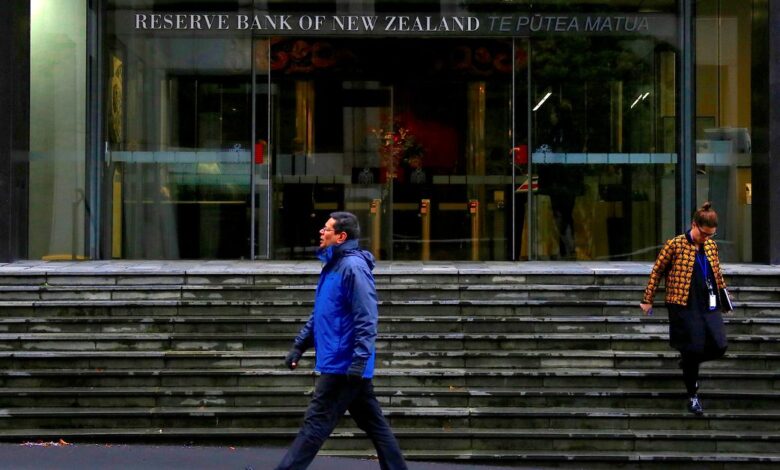New Zealand ends ultra-low interest rates, signals more hikes

Pedestrians stroll close to the principle entrance to the Reserve Financial institution of New Zealand situated in central Wellington, New Zealand, July 3, 2017. REUTERS/David Grey/File Photograph
WELLINGTON, Oct 6 (Reuters) – New Zealand’s central financial institution on Wednesday hiked rates of interest for the primary time in seven years and signalled additional tightening to come back, because it appears to be like to get on high of inflationary pressures and funky its red-hot housing market.
The 25 foundation level charge hike marks the beginning of a tightening cycle that had been anticipated to start in August, however was delayed after an outbreak of the coronavirus Delta variant and a lockdown that’s persevering with in its greatest metropolis Auckland.
The rise within the money charge to 0.50% by the Reserve Financial institution of New Zealand (RBNZ) had been forecast by all 20 economists polled by Reuters.
The New Zealand greenback briefly rose after the announcement however fell again to $0.6930, in keeping with broader market strikes, because the hike was anticipated by merchants.
“The Committee famous that additional elimination of financial coverage stimulus is anticipated over time, with future strikes contingent on the medium-term outlook for inflation and employment,” the RBNZ stated in saying its resolution.
The speed hike places New Zealand forward of most different developed financial system nations as central banks look to wind again emergency-level borrowing prices, though nations together with , the and have already raised charges.
In neighbouring Australia, the central financial institution held rates of interest at a report low 0.1% for an eleventh straight month on Tuesday.
“It was just about in keeping with what everybody was selecting,” stated Jason Wong, senior market strategist at BNZ in Wellington.
“What they have been forecasting nonetheless stays legitimate, which suggests we’re on a path in the direction of a sequence of charge hikes and the market is effectively priced for that,” he added.
Economists count on the benchmark charge to achieve 1.50% by the tip of subsequent 12 months and 1.75% by the tip of 2023, the Reuters ballot confirmed.
The South Pacific nation has loved a fast financial restoration since a COVID-driven recession final 12 months, partly as a result of it eradicated coronavirus and reopened its financial system earlier than others.
However with its borders nonetheless shut, labour and items shortages are pushing up inflation, in addition to contributing to a surging property market, which has been pushed by ultra-low rates of interest.
“Demand shortfalls are much less of a difficulty than the financial system hitting capability constraints…,” the RBNZ Committee famous within the minutes of the assembly.
The central financial institution stated headline CPI inflation is anticipated to extend above 4% within the near-term however return in the direction of its 2% midpoint over the medium time period.
Latest COVID-19 restrictions haven’t materially modified the medium-term outlook for inflation and employment, and financial exercise will get better rapidly when the measures are eased, it added.
New Zealand had stayed largely virus-free till an outbreak of the extremely infectious Delta pressure in August led to a snap lockdown. Whereas Auckland stays in lockdown, the federal government stated this week it would shift from its zero-COVID technique.
Further reporting by Tom Westbrook in Singapore; modifying by Richard Pullin
:





